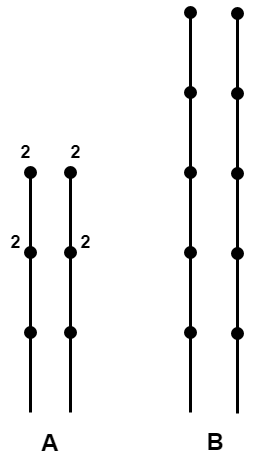DJOGamer PT
Arcane
Since this is a specific question I'll give a specific example.
Say your ARPG has a sword/axe/etc. skill tree that with each node/level it expands the range of attacks the characters can perform with the respective weapon said skill has control over.
Would it be better for the Skill Tree to have:
> Model A - fewer nodes/levels but needing more requeriments to unlock (be they of any kind like Stats, more Skill Points, XP tresholds, Items Quests, etc...)
> Model B - more nodes with less requeriments

I know you might just look at them and say: "Dude... both those models in the image require the same number of skill points to master. So that are you on about?".
But seriously think of the implications of each Model.
A:
> the fewer nodes exist, the more important they become and has such there's less likelihood of a node being superflous
> it becomes easier to balance each level
> slower progression as attaining new levels is more demaning
> can however lead to a sense of stagnation and dullness as there's big time intervals between each level with anything new to "spice things up"
> progression can feel "unnatural" since the player spends alot of time without seeing any improvements, and when he does level-up helearns a vast amount of new actions
> another and even worse consequence of this is that such sudden quantity of information can very well "overwhelm" 1st time players leaving them confused about the mechanics
> finally, the early game can easily lose it's challenge as the player possess a good range of actions he can perform
> overall a more "rigid" system for character progression but also more robust and demaning
B:
> the more nodes the less impact they have and some can even become unnecessary to obtain
> this opens up the door for min-maxing
> it more difficult to achieve a proper balance between nodes
> progression is however faster
> there's a nice sense of improvement
> player learn the mechanics smoothly
> early game retains it's challenge but because of the possibility of min-maxing the late can become a joke
> overall a more "flexible" system for character progression but more fragile and trivial
Say your ARPG has a sword/axe/etc. skill tree that with each node/level it expands the range of attacks the characters can perform with the respective weapon said skill has control over.
Would it be better for the Skill Tree to have:
> Model A - fewer nodes/levels but needing more requeriments to unlock (be they of any kind like Stats, more Skill Points, XP tresholds, Items Quests, etc...)
> Model B - more nodes with less requeriments

I know you might just look at them and say: "Dude... both those models in the image require the same number of skill points to master. So that are you on about?".
But seriously think of the implications of each Model.
A:
> the fewer nodes exist, the more important they become and has such there's less likelihood of a node being superflous
> it becomes easier to balance each level
> slower progression as attaining new levels is more demaning
> can however lead to a sense of stagnation and dullness as there's big time intervals between each level with anything new to "spice things up"
> progression can feel "unnatural" since the player spends alot of time without seeing any improvements, and when he does level-up helearns a vast amount of new actions
> another and even worse consequence of this is that such sudden quantity of information can very well "overwhelm" 1st time players leaving them confused about the mechanics
> finally, the early game can easily lose it's challenge as the player possess a good range of actions he can perform
> overall a more "rigid" system for character progression but also more robust and demaning
B:
> the more nodes the less impact they have and some can even become unnecessary to obtain
> this opens up the door for min-maxing
> it more difficult to achieve a proper balance between nodes
> progression is however faster
> there's a nice sense of improvement
> player learn the mechanics smoothly
> early game retains it's challenge but because of the possibility of min-maxing the late can become a joke
> overall a more "flexible" system for character progression but more fragile and trivial
Last edited:


















